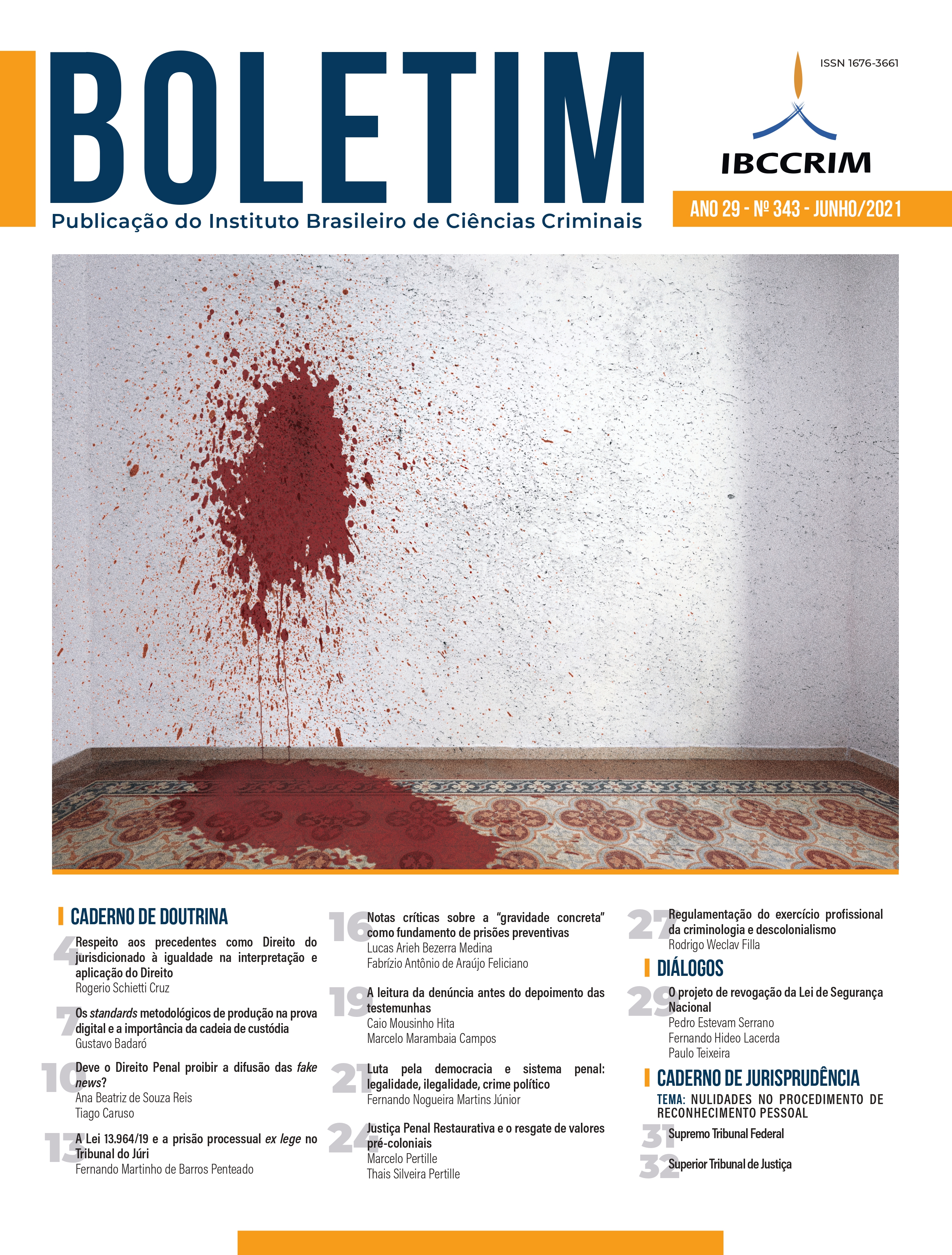Should criminal law prohibit fake news diffusion?
Views: 98Keywords:
Criminal Law, Fake News, Protected legal interestAbstract
This study intends to verify if the Brazilian Criminal Law can be used as a suitable instrument of protection against the spread of fake news in Brazil. This analysis is developed from the concept of fake news, the damage caused by its dissemination and the finding that there is an apparent gap in the Brazilian Law system. Thereafter, it was possible to conclude that, although Criminal Law could be a tool able to contain the damages mentioned, the criminalization of fake news necessarily depends on the observance of the function of Criminal Law, its informing principles and the constitutional rights and guarantees.
Downloads
Publication Facts
Reviewer profiles N/A
Author statements
- Academic society
- Instituto Brasileiro de Ciências Criminais
- Publisher
- IBCCRIM
References
BRASIL é o país que mais acredita em fake news no mundo. Terra, 05 out. 2018.
FÁBIO, André Cabette. O que é pós-verdade, a palavra do ano segundo a Universidade de Oxford. Nexo Jornal, 16 nov. 2016. Disponível em: https://www.nexojornal.com.br/expresso/2016/11/16/O-que-e-pos-verdade-a-palavra-do-ano-segundo-a-Universidade-de-Oxford. Acesso em: 22 fev. 2021.
MARS, Amanda. Como a desinformação influenciou nas eleições presidenciais?. El País, Nova York, 25 fev. 2018.
GENESINI, Silvio. A pós-verdade é uma notícia falsa. Revista USP, São Paulo, n. 116, p.45-58, jan./mar. 2018, p. 47.
PASQUINI, Patricia. 90% dos eleitores de Bolsonaro acreditaram em fake news, diz estudo. Folha de S. Paulo, São Paulo, 02 nov. 2018.
CARPANEZ, Juliana. Veja o passo a passo da notícia falsa que acabou em tragédia em Guarujá. Folha de S. Paulo, São Paulo, 27 set. 2018.
ROXIN, Claus. Derecho penal: parte general. Tomo I. Madrid: Civitas, 2008. p. 65-66.
ROXIN, Claus. Sobre o recente debate em torno do bem jurídico. In: ROXIN, Claus. Novos estudos de direito penal. São Paulo: Marcial Pons, 2014, p. 65.
PACELLI, Eugênio. Manual de Direito Penal. São Paulo: Atlas, 2019, p. 28.
NEISSER, Fernando Gaspar. Crime e mentira na política. Belo Horizonte: Fórum, 2016, p. 161.
PRADO, Luiz Regis. Tratado de Direito Penal brasileiro: parte geral. V. 1. Rio de Janeiro: Forense, 2019, p. 126.
SILVA, Virgílio Afonso. Direito Constitucional Brasileiro. São Paulo: Edusp, 2021, p. 633.
Downloads
Published
How to Cite
Issue
Section
License
Copyright of published articles belongs to the author, but with journal rights over the first publication and respecting the one-year exclusivity period. Authors may only use the same results in other publications by clearly indicating this journal as the medium of the original publication. If there is no such indication, it will be considered a situation of self-plagiarism.
Therefore, the reproduction, total or partial, of the articles published here is subject to the express mention of the origin of its publication in this journal, citing the volume and number of this publication. For legal purposes, the source of the original publication must be consigned, in addition to the DOI link for cross-reference (if any).


 Português (Brasil)
Português (Brasil)
 English
English
 Español (España)
Español (España)






